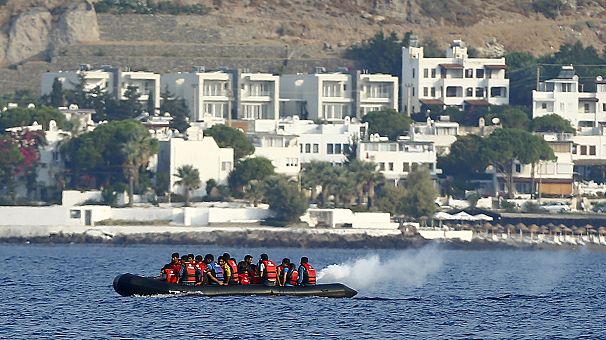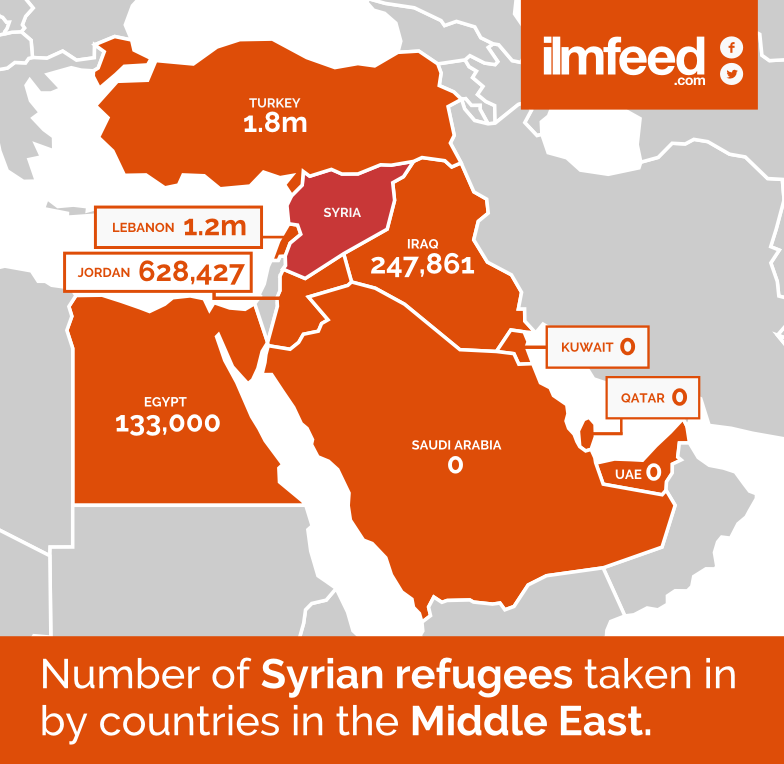Damning With Faint Praise, Deservedly
"Syrians are generally highly respected for their education and work ethic. Under refugee status you have effectively taken someone in without strings attached."
"What happens if they lost their jobs [as migrant workers]? Will they get the protection they need?"
"Given their size, and the large size of their non-national population [Saudi Arabia and allied Gulf states], it is understandable that the Gulf states are hesitant to have resettlements."
"The Saudis and other Gulf states deserve praise for their significant financial contributions. [But] so far they have really failed to provide leadership in what may well be the worst humanitarian crisis since [the] Second World War."
Mohamed Qadri, Gulf migrant rights researcher, Amnesty International
"In addition to those registered as refugees with UNHCR there are approximately 5,000 Syrians, mainly women and children, that have been recorded with UNHCR and receive assistance."
Aurvasi Patel, Senior Resettlement Coordinator, UNHCR
 |
| Euronews |
From Saudi Arabia to Qatar the Gulf states have done their part and more to sponsor the rebellion that arose against Syrian ruler Bashar al-Assad, a minority Shiite Alawite President in a regime that refused to give equal status and opportunities to the Syrian majority Sunni population. When protests emerged four years ago in Syria, the Syrian President chose to stamp out the protests with lethal force rather than negotiate with his subjects who were dissatisfied with some elements of his rule.
That violent reaction against criticism from Syrian Sunnis intensified as the regime ramped up its violence, imprisoning, torturing, raping, slaughtering, bombing neighbourhoods and creating a vast number of both dead and refugees out of Syria. That violent reaction had a reaction from Syria's neighbouring Sunni-majority states, the wealthy oil Kingdoms and Sheikdoms who chose to invest treasury in the support of Sunni militant groups to fight alongside Syrian rebels.
While the Gulf states have gone to great lengths to stimulate Sunni jihadis to gather for the purpose of opposing and unseating the Syrian regime, they have done little to help deal with the crisis of stateless people resulting from the years-long conflict. The Gulf states are being criticized for not having opened their borders for resettlement. The largest of the six Gulf states, Saudi Arabia with its population of 30 million, permits migrant workers entry to the country.
Claiming that they have brought in almost 2.5-million Syrians since the civil war began in 2011, the Saudis offer no evidence of this claim. They have, however, issued 1200,000 residence permits and given $700-million in aid to the refugees. Neither Saudi Arabia, Bahrain, Kuwait, Oman, Qatar and the United Arab Emirates has signed on to the UN convention on refugees relating to international asylum, while a mere 128 Syrian refugees have been registered in the GCC states, according to UNHCR.
If 128 documented Syrian refugees are seen as generous, if $700-million in financial assistance toward refugee upkeep is considered munificent by a country whose treasury has been bloated over the decades by oil-derived riches, whoever makes these official congratulatory assumptions has an obviously distorted impression about generosity in relation to capacity.
Syrians themselves understand that they are admitted to Gulf states on tolerance, with visas permitting them solely to work or to study on a temporary basis. The Central Department of Statistics & Information has estimated that 100,000 Syrians who took part in the annual hajj (pilgrimage to Mecca) have overstayed their temporary visas, living in Saudi Arabia undocumented, staying with relatives helping them to integrate into Saudi society. They do speak a common language, making the transition easier.
Saudi Arabia has increased its contributions to UNHCR from $200,000 in 2010 to $90-million in 2014, the funding used to support refugee camps in Jordan and Turkey. Kuwait's share has increased from $50,000 to $26-million in the same time frame, with Qatar contributing $112-million this year, as the number one donor per capita. But to place these amounts in the perspective they should be viewed in, they represent a pittance for these countries whose transfer of such sums isn't worth a blink.
"Saudi Arabia plays a vital role in helping Syrian refugees in Jordan and Lebanon through humanitarian aid including food, medical treatment, medicines and clothes", according to a spokesman for the Ministry of Foreign Affairs in Riyadh. What would we expect the Saudi government spokesman to state, other than to take pride in doing too little, too late, and too disinterested to pull its true weight in an issue they are partially responsible for?

Labels: Conflict, Gulf States, Refugees, Saudi Arabia, Syria

<< Home